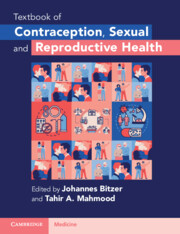Book contents
- Textbook of Contraception, Sexual and Reproductive Health
- Textbook of Contraception, Sexual and Reproductive Health
- Copyright page
- Contents
- About the Authors
- Contributors
- Section 1 Sexual and Reproductive Health and Rights, Public Health Aspects and Prevention in Sexual and Reproductive Healthcare
- Section 2 Sexual and Reproductive Healthcare
- Section 2A Sexual and Reproductive Healthcare: Contraception
- Chapter 9 The Reproductive Endocrinology of Contraception
- Chapter 10 Evidence-Based Clinical Practice in Contraceptive Counselling and Care
- Chapter 11 Combined Hormonal Contraception
- Chapter 12 Progestogen-Only Contraception
- Chapter 13 Nonhormonal Contraception
- Chapter 14 Permanent Methods of Contraception in Women
- Chapter 15 Emergency Contraception
- Chapter 16 Management of Issues Associated with Female Contraceptives
- Chapter 17 Management of Issues Associated with Female Contraceptives
- Chapter 18 Management of Issues Associated with Female Contraceptives
- Chapter 19 Management of Issues Associated with Female Contraceptives
- Chapter 20 Contraception in Women with Cancer
- Chapter 21 Contraception in Women with Benign Breast Disease and Benign Uterine and Ovarian Conditions
- Chapter 22 Contraception in Women with Cardiovascular Conditions
- Chapter 23 Contraception in Women with Metabolic Conditions
- Chapter 24 Contraceptive Choices for Women with HIV Infection
- Chapter 25 Contraception in Women with Neurological Conditions
- Chapter 26 Contraception in Women with Psychiatric Conditions
- Chapter 27 Contraception in Disabled Women
- Chapter 28 Contraception in Women with Immunosuppressive Diseases
- Chapter 29 Contraception in Women with Lupus Autoimmune Diseases
- Chapter 30 Contraception in Women with Chronic Kidney Disease
- Chapter 31 Contraception in Women with Diabetes
- Chapter 32 Contraception in Women with Thyroid Dysfunction
- Chapter 33 Contraception in Women with Polycystic Ovary Syndrome
- Chapter 34 Contraception in Women with Special Needs
- Chapter 35 Male Contraception
- Section 2B Sexual and Reproductive Healthcare: Termination of Pregnancy
- Section 2C Sexual and Reproductive Healthcare: Infertility
- Section 2D Sexually Transmitted Infections
- Section 3 Sexual Healthcare
- Section 4 Sexual and Reproductive Health Indicators and Policies
- Index
- References
Chapter 25 - Contraception in Women with Neurological Conditions
from Section 2A - Sexual and Reproductive Healthcare: Contraception
Published online by Cambridge University Press: 16 January 2024
- Textbook of Contraception, Sexual and Reproductive Health
- Textbook of Contraception, Sexual and Reproductive Health
- Copyright page
- Contents
- About the Authors
- Contributors
- Section 1 Sexual and Reproductive Health and Rights, Public Health Aspects and Prevention in Sexual and Reproductive Healthcare
- Section 2 Sexual and Reproductive Healthcare
- Section 2A Sexual and Reproductive Healthcare: Contraception
- Chapter 9 The Reproductive Endocrinology of Contraception
- Chapter 10 Evidence-Based Clinical Practice in Contraceptive Counselling and Care
- Chapter 11 Combined Hormonal Contraception
- Chapter 12 Progestogen-Only Contraception
- Chapter 13 Nonhormonal Contraception
- Chapter 14 Permanent Methods of Contraception in Women
- Chapter 15 Emergency Contraception
- Chapter 16 Management of Issues Associated with Female Contraceptives
- Chapter 17 Management of Issues Associated with Female Contraceptives
- Chapter 18 Management of Issues Associated with Female Contraceptives
- Chapter 19 Management of Issues Associated with Female Contraceptives
- Chapter 20 Contraception in Women with Cancer
- Chapter 21 Contraception in Women with Benign Breast Disease and Benign Uterine and Ovarian Conditions
- Chapter 22 Contraception in Women with Cardiovascular Conditions
- Chapter 23 Contraception in Women with Metabolic Conditions
- Chapter 24 Contraceptive Choices for Women with HIV Infection
- Chapter 25 Contraception in Women with Neurological Conditions
- Chapter 26 Contraception in Women with Psychiatric Conditions
- Chapter 27 Contraception in Disabled Women
- Chapter 28 Contraception in Women with Immunosuppressive Diseases
- Chapter 29 Contraception in Women with Lupus Autoimmune Diseases
- Chapter 30 Contraception in Women with Chronic Kidney Disease
- Chapter 31 Contraception in Women with Diabetes
- Chapter 32 Contraception in Women with Thyroid Dysfunction
- Chapter 33 Contraception in Women with Polycystic Ovary Syndrome
- Chapter 34 Contraception in Women with Special Needs
- Chapter 35 Male Contraception
- Section 2B Sexual and Reproductive Healthcare: Termination of Pregnancy
- Section 2C Sexual and Reproductive Healthcare: Infertility
- Section 2D Sexually Transmitted Infections
- Section 3 Sexual Healthcare
- Section 4 Sexual and Reproductive Health Indicators and Policies
- Index
- References
Summary
Multiple sclerosis (MS) is an inflammatory disease characterised by demyelination and axonal degeneration in the central nervous system with a probable autoimmune aetiology [1]. In advanced stages of the disease persons may develop muscle stiffness and paralyses of the leg. Female hormones seem to play a role and could impact the course of the disease. Multiple sclerosis does not significantly impair fertility, although there is emerging evidence on decreased ovarian reserve. Pregnancy is associated with lower rates of MS relapse, while postpartum rates increase again [2].
- Type
- Chapter
- Information
- Textbook of Contraception, Sexual and Reproductive Health , pp. 170 - 173Publisher: Cambridge University PressPrint publication year: 2024

